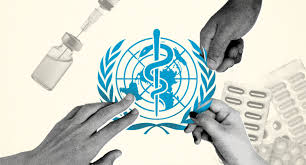By Peace Ene Idoko, Aniekan Akpan and Jennifer Odudo

Introduction: The Crossroads of Global Health
As we advance into the second quarter of the 21st century, the world finds itself grappling with overlapping health, social, and environmental crises that challenge the very fabric of global solidarity and governance. The scars left by the COVID-19 pandemic are still raw, and the lessons learned have been hard-earned. The inadequacy of global preparedness, the inequities in access to life-saving health technologies, and the disjointedness of international response mechanisms have compelled a reimagining of how we approach global health. In this moment of reckoning, the World Health Organisation (WHO) has stepped forward with a bold and ambitious strategy—the Fourteenth General Programme of Work (GPW 14)—to guide the world from 2025 to 2028.
This strategy, adopted by Member States at the 77th World Health Assembly, is more than just a policy document. It is a global health contract grounded in the principles of equity, resilience, and collective responsibility. It is a call to action for governments, international organisations, civil society, and private sector actors to align behind a shared vision: Health for All. As public health professionals and commentators, we see GPW 14 as a critical instrument for steering global health governance in an era defined by complexity and uncertainty.
The Strategic Imperative: Why GPW 14 is Urgent and Transformational
The release of GPW 14 could not have come at a more pivotal time. Health systems around the world are navigating the aftershocks of a global pandemic, the rise of non-communicable diseases (NCDs), emerging infectious diseases, and the accelerating impacts of climate change. Additionally, economic disparities, forced migration, armed conflict, and social injustices continue to exacerbate health inequities. Against this backdrop, WHO has articulated a comprehensive response strategy that integrates health into the broader development and security agenda.
The strategy’s overarching aim is to save 40 million lives by promoting healthier populations, providing equitable and quality health services, and protecting people from health emergencies. It is built around six strategic objectives, each rooted in a deep understanding of the global health ecosystem and designed to foster systemic change rather than fragmented interventions.
Strategic Objectives: The Pillars of Global Health Transformation
1. Addressing Climate Change as a Health Crisis
Climate change is no longer a peripheral issue—it is central to the health and survival of populations worldwide. Rising temperatures, air pollution, and extreme weather events are directly linked to increased respiratory diseases, malnutrition, vector-borne diseases, and mental health conditions. GPW 14 calls for urgent action to build climate-resilient health systems, integrate health into climate adaptation policies, and support low-carbon healthcare infrastructure.
The strategy prioritises One Health, recognising the interconnectedness of human, animal, and environmental health. WHO will work with countries to assess climate-related health risks, develop national health adaptation plans, and reduce the carbon footprint of health systems through sustainable practices. This approach is not only about protecting health but also about positioning health as a lever for climate action.
2. Tackling the Root Causes of Ill Health
Health outcomes are shaped by social determinants such as poverty, education, housing, and access to clean water and nutritious food. GPW 14 advocates for a whole-of-government approach, embedding health in policies across sectors. It emphasises preventive action, focusing on reducing exposure to risk factors like tobacco use, alcohol abuse, unhealthy diets, and physical inactivity.
By addressing these determinants, the strategy aims to reduce the global burden of NCDs, promote mental well-being, and ensure health equity. The strategy also targets gender disparities, recognizing that women and girls often face systemic barriers to accessing health services and achieving optimal health outcomes.
3. Advancing Primary Health Care (PHC) for Universal Health Coverage (UHC)
Primary Health Care is the backbone of any effective health system. It is where 90% of health needs can be addressed, often at a fraction of the cost of hospital-based care. GPW 14 places PHC at the center of the global health agenda, calling for reinvestment in frontline services, community-based care, and integrated service delivery.
WHO will support countries in developing context-specific PHC models, expanding essential public health functions, and improving health governance. The strategy also highlights the need to empower communities, ensuring that care is not only accessible but also culturally appropriate and gender-sensitive.
4. Expanding Service Coverage and Financial Protection
In a world where billions lack access to basic health services and many are pushed into poverty due to healthcare costs, GPW 14 demands a rethinking of health financing. It calls for public investment in health, elimination of out-of-pocket payments for essential services, and equity-focused financing mechanisms.
WHO will work with countries to develop sustainable health financing strategies, track health expenditures, and support the implementation of social protection systems. The goal is to ensure that no one is left behind and that health systems are financially resilient and inclusive.
5. Strengthening Health Emergency Preparedness
The next pandemic is not a question of if, but when. GPW 14 builds on the hard lessons of COVID-19, urging countries to invest in early warning systems, emergency workforce capacity, and resilient supply chains. It emphasizes the need for integrated surveillance, rapid diagnostics, and cross-sectoral coordination.
WHO will support the development of national health security action plans, aligned with the International Health Regulations (IHR 2005) and other emerging international legal frameworks. The strategy also advocates for equitable access to medical countermeasures, particularly for low- and middle-income countries (LMICs).
6. Responding Rapidly and Effectively to Health Emergencies
Effective emergency response requires speed, coordination, and equity. GPW 14 outlines mechanisms for real-time threat detection, rapid mobilization of resources, and inclusive humanitarian response. It focuses on maintaining essential health services during crises and ensuring that vulnerable populations—including refugees, people with disabilities, and the elderly—receive timely and appropriate care.
WHO’s Core Work: Leadership in Action
The strategy reinforces WHO’s role as a technical leader, normative authority, and trusted global partner. Four corporate outcomes define how WHO will deliver on its mandates:
- Effective Leadership and Convening: WHO will strengthen its role in setting the global health agenda, bringing together diverse stakeholders to foster multilateral collaboration.
- High-Quality Technical Solutions: WHO will enhance its normative work, developing evidence-based guidelines, promoting research and innovation, and facilitating technology transfer.
- Tailored Country Support: WHO will expand its presence in over 150 countries, providing technical assistance, capacity building, and policy support tailored to national contexts.
- Organisational Excellence: WHO will implement results-based management, improve accountability mechanisms, and optimise its financial and human resources.
Optimizing WHO’s Performance: From Vision to Reality
To achieve its goals, WHO must transform how it operates. GPW 14 commits to:
- Strengthening Country Offices: Increasing technical capacity and decentralising decision-making to ensure localised impact.
- Digital Transformation: Leveraging technology for data-driven decision-making, real-time surveillance, and health information systems.
- Sustainable Financing: Raising US$ 11.13 billion over four years, with a focus on flexible funding and transparent resource allocation.
- Inclusive Workforce: Building a diverse, empowered, and gender-balanced team dedicated to delivering on WHO’s mission.
Implementation: A Collective Effort
GPW 14 is a shared endeavour. Its success hinges on:
- Government Leadership: Aligning national policies with the strategy, investing in health systems, and fostering political will.
- Partnerships: Engaging UN agencies, donors, civil society, and private sector actors in coordinated action.
- Community Empowerment: Involving people in decisions that affect their health, ensuring accountability and social participation.
- Monitoring and Evaluation: Tracking progress through robust indicators, ensuring that commitments translate into tangible results.
Implications for Stakeholders: The Power of Collective Responsibility
For Member States, GPW 14 offers a roadmap to align national health priorities with global goals. It provides guidance on where to invest, how to structure health systems, and how to engage stakeholders effectively.
For donors and development partners, the strategy presents a framework for strategic investment, emphasizing the importance of flexible funding and long-term commitments.
For civil society and non-state actors, it provides opportunities for meaningful engagement, advocacy, and service delivery, particularly in marginalized communities.
For the private sector, GPW 14 highlights the importance of responsible innovation, affordable access, and ethical business practices.
Conclusion: The Time to Act is Now
The WHO Global Health Strategy 2025–2028 is a bold, comprehensive, and necessary response to the multifaceted health challenges of our time. It is a blueprint for a world where health systems are resilient, equitable, and prepared. It is a call to action for all of us—to lead, to partner, and to deliver.
As we face an uncertain future, one thing is clear: health is not optional. It is the foundation of peace, prosperity, and human dignity. GPW 14 offers us the tools, the framework, and the vision. What remains is the will to act.
Let us rise to this moment. Let us build a world where no one is left behind. Let us make health for all a reality.
